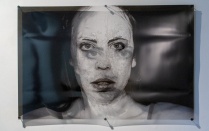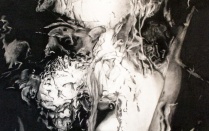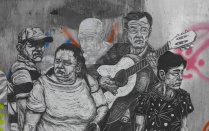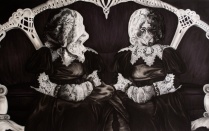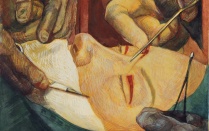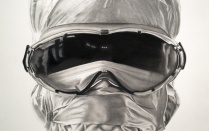MFA Curriculum
The MFA program is 2 years and 60 credits (15 credits per semester over 4 semesters).
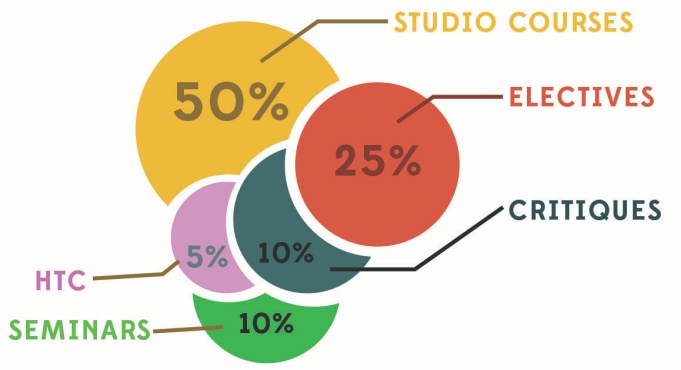
Studio Courses
30 Credits
Graduate research studios (LAB) are the core of the MFA program. Each semester, students engage in 6 to 9 credit hours of intense studio exploration, research, production, and critique of their individual creative work, in close collaboration with their MFA faculty advisors.
There is a wide selection of studio courses to choose from in the Art department. These should be taken at the graduate level (500 or higher); one undergraduate studio course may be taken with permission of the Director of Graduate Studies. Students can also take graduate-level studio courses in other departments.
Thesis Project Supervision
6 credits, (REQUIRED COURSE ART 690/3 CREDITS FOR 2 SEMESTERS)
Students work with a selected group of faculty mentors to develop their MFA thesis project over the course of their second year of study. Meetings several times a semester aim to provide focus and cohesion to both the final exhibition and the written component.
Graduate Seminar
6 credits, (REQUIRED COURSES ART 509/ART 510)
Each fall semester, both first and second year MFA students participate in an interdisciplinary graduate seminar. Students participate in regular critique groups to develop their ability to discuss, describe, assess, contextualize and understand their own work and the work of their fellow graduate students. Seminar offerings include research methods, professional practice and other topics related to contemporary art practice.
Academic Elective Courses
12 credits
Students choose academic elective courses to meet their individual MFA curriculum goals. These are lecture (LEC) and seminar courses (SEM) that can be taken in any UB graduate-level program.
Students are encouraged to select courses that support their fields of inquiry in history, theory, and criticism offered within the Art department and other units across the university. Popular departments include Media Studies, Architecture, Gender Studies, Theatre and Dance, and Philosophy.
Open Elective Courses
3 credits
Students choose open elective courses to meet their individual MFA curriculum goals. Internships may be used to fulfill this requirement.
Introduction to Critical Theory
3 credits, (VS 521 REQUIRED)
Students are required to take a three-credit Introduction to Critical Theory course which covers History/Theory/Criticism (HTC). These are crucial areas of study for MFA candidates.
International Exchange
Departments across the university offer a diverse range of international exchange programs. These take place during the semester, winter recess and summer. If you are interested in participating in an exchange, please consult with the Director of Graduate Studies about the program you are interested in.
Sample Plan of Study
This is an interdisciplinary program, and there are no concentration-specific requirements.
Year 1
1st Year Fall Semester | 1st Year Spring Semester |
|---|---|
Required ART 509 Graduate Seminar I (3 credits) | Required ART 598 Teaching Supervision (1 credit) |
Required VS 521 Intro to Critical Theory (3 credits) | Academic Elective (3 credits) |
Academic Elective (3 credits) | |
Academic Elective (3 credits)
| Graduate-Level Studio Course (3 credits) |
Graduate-Level Studio Course (3 credits) | ART 599 First Year Graduate Research (3 credits) |
ART 599 First Year Graduate Research (3 credits) | ART 599 First Year Graduate Research (3 credits) |
Year 2
2ndYear Fall Semester | 2nd Year Spring Semester |
|---|---|
Required ART 510 Graduate Seminar II (3 credits) | Required ART 690 w/ Thesis Chair (3 credits) |
Required ART 690 w/ Thesis Chair (3 credits) | Required ART 598 Teaching Supervision (1 credit) |
Required ART 598 Teaching Supervision (1 credit) | Open Elective – studio, seminar, lecture (3 credits) |
Academic Elective (3 credits) | ART 699 Second Year Graduate Research (3 credits) |
ART 699 Second Year Graduate Research (3 credits) | ART 699 Second Year Graduate Research (3 credits) |
ART 699 Second Year Graduate Research (3 credits) | ART 699 Second Year Graduate Research (3 credits) |
NOTE: This program of study is an example and does not need to be strictly followed as long as all program requirements are met. In the sample shown, students take 2 academic electives in the spring semester of their first year and by doing so the final semester of study is freed up for complete immersion in the thesis project. Alternatively, students may wish to divide the 4 academic electives evenly across 4 semesters, or some other variation. Please contact the Director of Graduate Studies for individualized guidance on coursework structure.
Supervised Teaching Requirement for Teaching Assistants
Each semester, Teaching Assistants are required to register for one credit of ART 598, Supervised Teaching. These credits do not count towards the 60 credits required for the MFA degree. Teaching supervisions ensure that Teaching Assistants feel supported as they develop their skills as college-level educators.
Frequency of Graduate Course Offerings
Required courses are offered at least once per year. Most graduate-level studio courses are offered on alternate semesters. Most academic seminars rotate over a one-year or two-year cycle.
